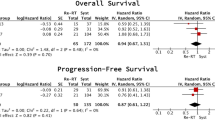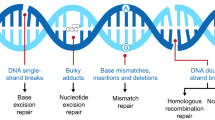Abstract
Background
The use of alkylating chemotherapy versus bevacizumab for recurrent glioblastoma remains controversial. Here, we tested the hypothesis that the activity of alkylators, but not that of bevacizumab, would be associated with the O6-methylguanine DNA methyltransferase (MGMT) promoter methylation status.
Methods
We analyzed a cohort of patients treated at centers of the German Glioma Network or the University Hospital Zurich with alkylating agent-based chemotherapy (n = 260) or bevacizumab without or with irinotecan (n = 84) for first recurrence of glioblastoma. Outcome was stratified for O6-methylguanine DNA methyltransferase (MGMT) status and crossover to bevacizumab or alkylators at further progression.
Results
Median post-recurrence survival-1 (PRS-1) for patients receiving alkylating agents at first recurrence was longer than with bevacizumab (11.1 versus 7.4 months, p < 0.001). The use of alkylators was associated with longer PRS-1 for patients with a methylated versus unmethylated MGMT promoter (p = 0.017). For patients receiving bevacizumab, PRS-1 was not different with or without MGMT promoter methylation. PRS-1 was longer in patients receiving alkylating chemotherapy compared to bevacizumab for patients with methylated (p < 0.001) or unmethylated MGMT promoter (p = 0.034). For patients with alkylators at first recurrence receiving bevacizumab at any further recurrence, PRS-1 was longer than in patients receiving bevacizumab first and alkylators thereafter (p = 0.002).
Conclusions
This study confirms limited value of bevacizumab in recurrent glioblastoma independent of MGMT status. Alkylating agents have activity in recurrent glioblastoma, especially in the context of MGMT promoter methylation.



Similar content being viewed by others
References
Batchelor TT et al (2013) Phase III randomized trial comparing the efficacy of cediranib as monotherapy, and in combination with lomustine, versus lomustine alone in patients with recurrent glioblastoma. J Clin Oncol 31:3212–3218. https://doi.org/10.1200/jco.2012.47.2464
Clarke J et al (2017) Multicenter, Phase 1, dose escalation study of hypofractionated stereotactic radiation therapy with bevacizumab for recurrent glioblastoma and anaplastic astrocytoma. Int J Radiat Oncol Biol Phys 99:797–804. https://doi.org/10.1016/j.ijrobp.2017.06.2466
Fleischmann DF et al (2019) Bevacizumab reduces toxicity of reirradiation in recurrent high-grade glioma. Radiother Oncol 138:99–105. https://doi.org/10.1016/j.radonc.2019.06.009
Flieger M et al (2014) Re-irradiation and bevacizumab in recurrent high-grade glioma: an effective treatment option. J Neurooncol 117:337–345. https://doi.org/10.1007/s11060-014-1394-5
Friedman HS et al (2009) Bevacizumab alone and in combination with irinotecan in recurrent glioblastoma. J Clin Oncol 27:4733–4740. https://doi.org/10.1200/JCO.2008.19.8721
Gramatzki D et al (2016) Glioblastoma in the Canton of Zurich, Switzerland revisited: 2005 to 2009. Cancer 122:2206–2215. https://doi.org/10.1002/cncr.30023
Gramatzki D et al (2018) Bevacizumab may improve quality of life, but not overall survival in glioblastoma: an epidemiological study. Ann Oncol 29:1431–1436. https://doi.org/10.1093/annonc/mdy106
Hamza MA, Mandel JJ, Conrad CA, Gilbert MR, Yung WK, Puduvalli VK, DeGroot JF (2014) Survival outcome of early versus delayed bevacizumab treatment in patients with recurrent glioblastoma. J Neurooncol 119:135–140. https://doi.org/10.1007/s11060-014-1460-z
Hegi ME et al (2005) MGMT gene silencing and benefit from temozolomide in glioblastoma. N Engl J Med 352:997–1003. https://doi.org/10.1056/NEJMoa043331
Hundsberger T, Brugge D, Putora PM, Weder P, Weber J, Plasswilm L (2013) Re-irradiation with and without bevacizumab as salvage therapy for recurrent or progressive high-grade gliomas. J Neurooncol 112:133–139. https://doi.org/10.1007/s11060-013-1044-3
Johnson DR, O’Neill BP (2012) Glioblastoma survival in the United States before and during the temozolomide era. J Neurooncol 107:359–364. https://doi.org/10.1007/s11060-011-0749-4
Kreisl TN et al (2009) Phase II trial of single-agent bevacizumab followed by bevacizumab plus irinotecan at tumor progression in recurrent. J Clin Oncol 27:740–745. https://doi.org/10.1200/JCO.2008.16.3055
Macdonald DR, Cascino TL, Schold SC Jr, Cairncross JG (1990) Response criteria for phase II studies of supratentorial malignant glioma. J Clin Oncol 8:1277–1280. https://doi.org/10.1200/JCO.1990.8.7.1277
Ohgaki H et al (2004) Genetic pathways to glioblastoma: a population-based study. Cancer Res 64:6892–6899. https://doi.org/10.1158/0008-5472.Can-04-1337
Piccioni DE et al (2014) Deferred use of bevacizumab for recurrent glioblastoma is not associated with diminished efficacy. Neuro-oncol 16:815–822. https://doi.org/10.1093/neuonc/nou028
Stupp R et al (2005) Radiotherapy plus concomitant and adjuvant temozolomide for glioblastoma. N Engl J Med 352:987–996. https://doi.org/10.1056/NEJMoa043330
Taal W et al (2014) Single-agent bevacizumab or lomustine versus a combination of bevacizumab plus lomustine in patients with recurrent glioblastoma (BELOB trial): a randomised controlled phase 2 trial. Lancet Oncol 15:943–953. https://doi.org/10.1016/s1470-2045(14)70314-6
Weller M et al (2015) MGMT promoter methylation is a strong prognostic biomarker for benefit from dose-intensified temozolomide rechallenge in progressive glioblastoma: the DIRECTOR trial. Clin Cancer Res 21:2057–2064. https://doi.org/10.1158/1078-0432.CCR-14-2737
Weller M et al (2017) European Association for Neuro-Oncology (EANO) guideline on the diagnosis and treatment of adult astrocytic and oligodendroglial gliomas. Lancet Oncol 18:e315–e329. https://doi.org/10.1016/s1470-2045(17)30194-8
Wen PY et al (2010) Updated response assessment criteria for high-grade gliomas: response assessment in neuro-oncology working. J Clin Oncol 28:1963–1972. https://doi.org/10.1200/JCO.2009.26.3541
Wick W et al (2010) Phase III study of enzastaurin compared with lomustine in the treatment of recurrent intracranial. J Clin Oncol 28:1168–1174. https://doi.org/10.1200/JCO.2009.23.2595
Wick W, Stupp R, Gorlia T, Bendszus M, Sahm F, Bromberg J, Brandes A (2016) Phase II part of EORTC study 26101: the sequence of bevacizumab and lomustine in patients with first recurrence of a glioblastoma. J Clin Oncol 34(15_suppl):2019
Wick W et al (2017) Lomustine and bevacizumab in progressive glioblastoma. N Engl J Med 377:1954–1963. https://doi.org/10.1056/NEJMoa1707358
Acknowledgements
The authors would like to thank the patients and their families and acknowledge the contributions of all health care providers involved in the care of the patients.
Funding
There was no funding for the current study. The German Glioma Network was supported by the Deutsche Krebshilfe.
Author information
Authors and Affiliations
Consortia
Contributions
KS, SL, DG, UH, MaW, GS, NT, US, MT, WW contributed patient data, KS, BH and MiW wrote the manuscript, BH performed statistical analyses, GR, FL and TP were involved in molecular analysis of tumors for a subset of patients. MiW designed the project and supervised the study. All authors discussed the results and reviewed the manuscript.
Corresponding author
Ethics declarations
Conflict of interest
KS has received honoraria for board participation from Roche. GR has received honoraria from advisory boards from Abbvie. UH reports grants and personal fees from Roche, personal fees and non-financial support from Medac, personal fees and non-financial support from Bristol-Myers Squibb, personal fees from Novocure, personal fees from Novartis, personal fees from Daichii-Sankyo, personal fees from Riemser, personal fees from Noxxon, personal fees from AbbVie, personal fees from Bayer. MiW has received research grants from Abbvie, Adastra, Dracen, Merck, Sharp & Dohme (MSD), Merck (EMD), Novocure, Piqur and Roche, and honoraria for lectures or advisory board participation or consulting from Abbvie, Basilea, Bristol Meyer Squibb (BMS), Celgene, Merck, Sharp & Dohme (MSD), Merck (EMD), Novocure, Orbus, Roche and Tocagen. The other authors report no conflicts of interest.
Availability of data and material
The datasets of the study are available from the corresponding author on reasonable request and provided that the request is in line with the regulations of the review committees.
Ethical approval
This study was approved by the responsible review committees of the participating centers of the German Glioma Network in Germany (www.gliomnetzwerk.de) (353/2003 V) and the University Hospital Zurich, Switzerland (2015-0437). The study was performed in accordance with the Declaration of Helsinki.
Additional information
Publisher's Note
Springer Nature remains neutral with regard to jurisdictional claims in published maps and institutional affiliations.
Electronic supplementary material
Below is the link to the electronic supplementary material.
Rights and permissions
About this article
Cite this article
Seystahl, K., Hentschel, B., Loew, S. et al. Bevacizumab versus alkylating chemotherapy in recurrent glioblastoma. J Cancer Res Clin Oncol 146, 659–670 (2020). https://doi.org/10.1007/s00432-019-03086-9
Received:
Accepted:
Published:
Issue Date:
DOI: https://doi.org/10.1007/s00432-019-03086-9




